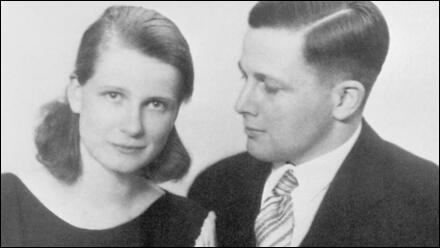Klaus Bonhoeffer
Klaus Bonhoeffer, the son of the psychiatrist Karl Bonhoeffer, and the older brother of Dietrich Bonhoeffer, was born Breslau, Germany, in 1901. He went to the Grunewald Gymnasium in Berlin where he became friends with Hans Dohnányi. He studied as a lawyer and in 1936 was appointed head of the Lufthansa legal department.
An opponent of Adolf Hitler Bonhoeffer became involved in an attempt to overthrow the government in Nazi Germany. According to Louis L. Snyder: "From the beginning of his career he was convinced that the Nazi movement had stained the honour of his country. He therefore worked with various Resistance groups to eliminate it."
Dietrich Bonhoeffer found work as a pastor in London. When he heard that Martin Niemöller and Karl Barth had formed the anti-Nazi Confessional Church, Bonhoffer decided to return and join the struggle. He wrote to Reinhold Niebuhr: "I must live through this difficult period of our national history with the Christian people of Germany…. Christians in Germany are going to face the terrible alternative of either willing the defeat of their nation in order that Christian civilization may survive, or willing the victory of their nation and thereby destroying our civilization. I know which of these alternatives I must choose."

Elisabeth Sifton and Fritz Stern have argued: "Seeing that the Nazis intended to impose their dogma - that race, not religion, determined one’s civic identity - on the churches, Bonhoeffer joined other pastors in challenging the conservative-reactionary church leaders who acceded to this view. The dissidents organized themselves into what became known as the Confessing Church, which more than two thousand pastors joined, and Bonhoeffer alerted ecumenical organizations abroad to the Nazi threats. In 1935, he readily accepted a teaching position at a remote Pomeranian estate in a quasi-legitimate “preachers’ seminary.” He spent three years there, but went often to Berlin to see his parents - and to talk to his brother-in-law Hans, who was fighting the Nazis on different fronts." By 1937 over 800 pastors had been arrested. Bonhoeffer was banned from public meetings in Berlin, but he continued to teach and guide his students in Pomerania.
In early 1943 a group of anti-Nazis that included Klaus Bonhoeffer, Wilhelm Canaris, Friedrich Olbricht, Henning von Tresckow, Friedrich Olbricht, Werner von Haeften, Claus von Stauffenberg, Fabian Schlabrendorff, Carl Goerdeler, Julius Leber, Ulrich Hassell, Hans Oster, Dietrich Bonhoeffer, Peter von Wartenburg, Hans Dohnányi, Erwin Rommel, Franz Halder, Hans Gisevius, Fabian Schlabrendorff, Ludwig Beck and Erwin von Witzleben met to discuss what action they should take. Initially the group was divided over the issue of Hitler. Gisevius and a small group of predominantly younger conspirators felt that he should be killed immediately. Canaris, Witzleben, Beck, Rommel and most of the other conspirators believed that Hitler should be arrested and put on trial. By using the legal system to expose the crimes of the regime, they hoped to avoid making a martyr of Hitler. Oster and Dohnanyi argued that after Hitler was arrested he should be brought before a panel of physicians chaired by Dohnanyi's father-in-law, the psychiatrist Karl Bonhoeffer, and declared mentally ill.
On 5th April 1943, Schutzstaffel (SS) officers entered the Abwehr building in Berlin. Wilhelm Canaris was told that they had received information that Hans Dohnányi had been taking bribes for smuggling Jews into Switzerland. After carrying out a search of the premises Dohnányi was arrested. Later that day Dohnányi's wife, Klaus Bonhoeffer and Dietrich Bonhoeffer were also taken into custody. Dohnányi managed to send out a message to General Ludwig Beck asking him to destroy his records of the conspiracy. However, Beck insisted that they be preserved for historical evidence of what Good Germans had done to fight Nazism.
Klaus Bonhoeffer was s entenced to death on 2nd February, 1945 but was held in captivity for over two months. He was shot in Berlin as the Red Army approached the city on 23rd April, 1945.
Primary Sources
(1) Joachim Fest, Plotting Hitler's Death (1997)
On April 21 - the same day that an agitated Hitler called General Karl Koller, the chief of staff of the Luftwaffe, to inform him that the heart of Berlin was under artillery bombardment - eleven men who had not yet been sentenced were released. One of them sought, on the spur of the moment, to obtain the release of other prisoners as well. On April 23 his efforts resulted in the freeing of prisoners incarcerated at Moabit prison. The SS, however, had taken charge of liquidating the Gestapo prison on Lehrterstrasse. Here, too, twenty-one inmates facing lesser charges had already been released, among them the lawyer Hans Lukaschek and Kraft von Palombini, who had sheltered Goerdeler. Some of the remaining inmates were informed that they would be released after transfer to headquarters on Prinz-Albrecht-Strasse. They were herded together by SS guards and marched off down Lehrterstrasse in a light rain at about one o'clock in the morning. When they reached the corner of Invalidenstrasse, the guards ordered the prisoners to proceed across a field of rubble. The command "Ready, fire!" rang out and the prisoners fell, all of them shot in the neck. Among those murdered in this fashion were Klaus Bonhoeffer, Riidiger Schleicher, Friedrich Justus Perels, and Albrecht Haushofer.
The next day some of the remaining inmates were released and the others were turned over to the judicial authorities. After midnight, however, another SS detachment appeared, took away Albrecht von Bernstorff, Karl Ludwig von Guttenberg, and the trade union leader Ernst Schneppenhorst, and murdered them. When day broke, the rest of the prisoners managed to persuade the warden that it was in his own best interest to let them go before the Russian troops arrived. At around six in the evening, the last political prisoners were released from Lehrterstrasse, including Justus Delbruck of Military Intelligence, Professors Gerhard Ritter, Adolf Lampe, and Theodor Steltzer. They fled as the battle for Berlin began in earnest.

